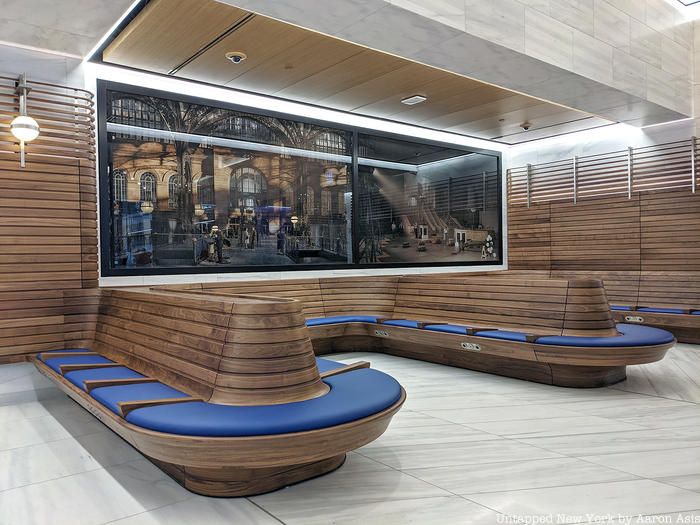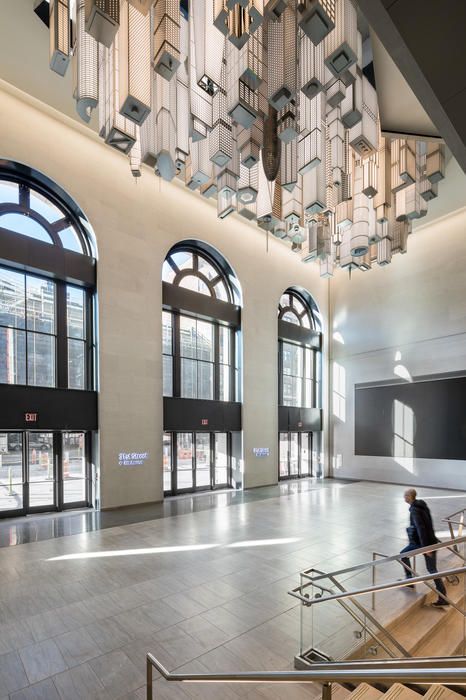Robert Rauschenberg's New York: When Giants Walked the Earth
Explore Rauschberg's photographs and collages featuring images of NYC!

When the new Moynihan Train Hall opened in January, one of the big stars of the hall was the public art installed throughout. Installations by Kehinde Wiley, Stan Douglas, and duo Elmgreen & Dragset brought excitement and creativity to the brand new space. The $1.6 billion hall transformed the old James A. Farley postal building, a 1912 Beaux-Arts-style design by McKim, Mead and White, into a museum of its own.
Join Untapped New York on a tour of the artistic side of Moynihan, with a little bonus trip over to Penn Station to talk about a rarely recognized artistic remnant of the old Penn Station. Of course, there will be frameable handouts! On the in-person tour, unearth all the exciting art in Moynihan Train Hall. Hear the stories about the creation of the art and the artists themselves. Learn about some of the new art on the way to Moynihan. Explore some of the outdoor art which usually gets ignored. And discover a Penn Station remnant art piece not featured on our public Remnants of Penn Station tour. The event is free for Untapped New York Insiders (and get your first month free with code JOINUS).

The artworks, which cost $6.7 million, were commissioned through a partnership between Empire State Development and the Public Art Fund. Kehinde Wiley created a hand-painted glass triptych titled Go for the ceiling at the West 33rd Street entrance. This was Wiley’s first permanent site-specific installation in glass. The work depicts Black New Yorkers in breakdancing-inspired poses against a blue sky, drawing from some of his earlier works. Wiley also based a woman pointing her finger on Michelangelo’s Creation of Adam at the Sistine Chapel. The artist stated that he wished to “play with the language of ceiling frescoes” because in ceiling frescoes, “people [express] a type of levity and religious devotion and ascendancy.” Wiley is best-known for works like Napoleon Leading the Army over the Alps and the official portrait of President Barack Obama, which is on view at the Brooklyn Museum.
Stan Douglas conducted archival research to recreate nine moments from the old Penn Station. To capture this history, he cast 400 actors to dress in period costumes over four days — 100 on each day of shooting — then used digitally recreated interiors of the demolished building as a backdrop. Douglas’s photographic panels, including one in which Black vaudeville performers staged a show for passengers after a 1914 snowstorm and another of a depiction of outlaw Celia Cooney, hang along the station’s 80-foot-long waiting area.


As part of Emgreen & Dragset’s work The Hive, over 30,000 pounds of futuristic skyscrapers hang upside down by the West 31st Street entry. The 91 real and fictional buildings contain windows that glow with tiny lights of 72,000 LEDs, and six of the buildings can change colors. Dragset told The New York Times that the installation was named “The Hive” to reflect how the diversity and richness of cities can function because people accept certain rules for coexisting.
“In a global city synonymous with art and culture it is fitting that these works — which dazzle in their beauty, humanity, ambition, and technical mastery — capture the spirit of this remarkable new transit hub,” said Public Art Fund director Nicholas Baume in a statement. “Captivating and powerful, each work is inspired by New York’s rich heritage, its diverse and talented people, and its irrepressible creativity.”
Join Untapped New York on a tour of the artistic side of Moynihan with a little bonus trip over to Penn Station to talk about a rarely recognized artistic remnant of the old Penn Station. The event is free for Untapped New York Insiders (and get your first month free with code JOINUS).
Next, check out Justin River’s Op-Ed “Moynihan Trail Hall is Not Perfect, But it’s Close Enough.”
Subscribe to our newsletter